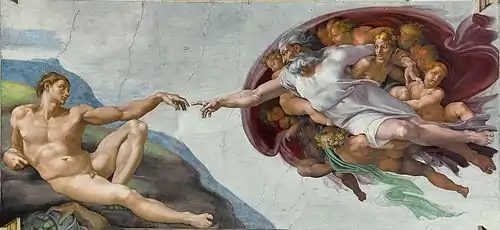Ahmadiyya views on evolution
The Ahmadiyya Movement in Islam universally accepts the process of evolution, albeit divinely guided, and actively promotes it. Over the course of several decades, the movement has issued various publications in support of the scientific concepts behind the process of evolution and frequently engages in promoting how religious scripture supports the concept.
| Part of a series on | ||||
| Creationism | ||||
|---|---|---|---|---|
 | ||||
| Types | ||||
| Biblical cosmology | ||||
| Creation science | ||||
| Creation–evolution controversy | ||||
| Religious views | ||||
|
||||
Adam and Eve
Ahmadi Muslims reject the creationist doctrine that Adam was the first human being on Earth, and proclaim that he was appointed as the first Prophet of God. They point to a verse in the Quran which refers to the appointment of a representative of God on earth, rather than the creation of a new species:
[2:30] And when thy Lord said to the angels: ‘I am about to appoint a Vicegerent in the earth,’ they said: ‘Wilt Thou place therein such as will cause disorder in it, and shed blood? — and we glorify Thee with Thy praise and extol Thy holiness.’ He answered: ‘I know what you know not.’
Ahmadis reason that the angels could only have questioned the appointment of a human being as a prophet because they had already witnessed disorder and bloodshed amongst the already-existing humans.
The story of Adam and Eve as given in the Bible is viewed by Ahmadis as being more of an account of religious history than a history of the entire human race.
Belal Khalid, an Ahmadi scholar, states in his work, “Original Sin”:
When the stage of the full development of the mental faculties of man was reached, God sent His revelation to the most perfect man of that generation, namely, Hadhrat Adam (as). In short, the Quran teaches that man's physical creation and development are the result of a process of evolution and in the same way his intellectual development is also the result of a process of evolution. Hadhrat Adam (as) was not the first human being, but was the first human being whose intellect was capable of accepting and bearing the responsibility of revelation.”[1]
Guided evolution
Ahmadi Muslims do not take all the Quranic and Biblical creation narratives literally, but understand some of the passages metaphorically.[2] Darwinian evolution as well as intelligent design models are rejected as are certain aspects of Islamic creationism that some modernist religious bodies have postulated. Instead they propound the concept of "guided evolution" (analogous, or identical, to the doctrine of theistic evolution or evolutionary creationism).
Mirza Tahir Ahmad favored the perspective that the human race was created gradually via evolution under the supervision of God.[3] He interpreted the Quran's description of different human "stages", traditionally believed to refer to fetal development, as references to evolutionary stages:
And He [Allah/God] has created you in different stages and different forms ... And Allah has caused you to develop as a good growth from the earth.
— Qur'an 71:14,17
Ahmad believed that these verses support the notion that the creation of the human race was the culmination of a gradual evolutionary process, as opposed to a literalist reading of the creation story, in which mankind was created in an instant.[1] Thus Ahmadis accept the concept of evolution in principle, but do not accept Darwinian evolution in all its details. They deny that natural selection occurred purely by chance,[4] or merely by survival of the fittest[5] – and view each stage of the evolutionary process as being selectively and continually woven to an intricate level by one creator (Allah).[6]
Ahmadis contend that the processes of life on Earth started from one single point of species (bacteria)[7] with a mixture of water and a viscous clay-like substance.[8] The creation of Adam was a slow gradual evolutionary process that occurred over several stages, with each stage being of a variable timescale - perhaps over billions of years.[9]
In his book Revelation, Rationality, Knowledge and Truth (published 1998), Mirza Tahir Ahmad, the late leader of the Ahmadiyya movement, elaborated the complex mechanism of evolution as having been played more like strategic game of chess than a game of dice.[10] Subsequently evolutionary processes could only have been guided by a vastly higher intelligence, like God.
Creation of the universe
| Part of a series on:
Ahmadiyya |
|---|
 |
Similar to theistic realism and the stance of modernist Islamic scholars, Ahmadis adopt a scientific cosmological approach to explaining the formation of universe initiated from the Big Bang.[11] They interpret some Quranic verses as references to the Big Bang theory, the formation of the Earth, and the Big Crunch theory.
Do not the Unbelievers see that the heavens and the earth were joined together,
then We clove them asunder and We created every living thing out of the water.
Will they not then believe?
— Qur'an 21:30
Then turned He to the heaven when it was smoke,
and said unto it and unto the earth:
Come both of you, willingly or loth.They said: We come, obedient.
— Qur'an 41:11
On the day when We will roll up heaven like the
rolling up of the scroll for writings,
as We originated the first creation, (so) We
shall reproduce it; a promise (binding on Us);surely We will bring it about.
— Qur'an 21:104
Six individual phases of creation
Furthermore, Ahmadis highlight several verses in the Quran where it mentions of "Six periods of creation" and use these verses to explain the theory that the universe began roughly 13 billion years ago. A single period, in the Ahmadi view, has no definitive timescale and could mean anywhere from one day to billions of years.
And, verily, We created the heavens
and the Earth and all that is between
them in six periods and no wearinesstouched Us.
— Qur'an 50:38
According to the Ahmadiyya view the universe passed from stage to stage till the Earth assumed a shape and developed properties which could sustain human life.
Extraterrestrial evolution
Generally, Ahmadis believe that life is almost certainly not limited to planet Earth. The possibility of life having evolved on other planets is clearly established in the first chapter of the Qur'an which speaks of the plurality of worlds:
All praise belongs to Allah, Lord of All the Worlds.
— Quran 1:2
It is Allah who has created seven heavens and of the earth, the like of them. [His] command descends among them so you may know that Allah is over all things competent and that Allah has encompassed all things in knowledge.
— Quran 65:12
The following verse corroborates this interpretation:
And among His Signs is the creation of the heavens and the earth, and of whatever living creatures (da'bbah) He has spread forth in both. And He has the power to gather them together when He will so please".
— 42:29
Ahmadis believe that any planet that contains the key ingredient of life—water—may also harbour life, as God has created all living things from water:
We (God) created every living thing out of the water.
— Qur'an 21:30
References
- Quran, Adam and Original Sin, by Belal Khalid
- Guided evolution and punctuated equilibrium
- Fouad, Khadija E. (2018). "Pedagogical Implications of American Muslims' Views on Evolution". In Hasan Deniz and Lisa A. Borgerding (ed.). Evolution Education Around the Globe. Springer. p. 27-29. ISBN 9783319909394.
- Revelation, Rationality, Knowledge & Truth: Part V, Section 5: Survival by Accident or Design?
- Revelation, Rationality, Knowledge & Truth: Part V, Section 8: Natural Selection and Survival of the Fittest
- Revelation, Rationality, Knowledge & Truth: Part V, Section 12: Organic Systems and Evolution
- Review of Religions eGazette November 2008
- Revelation, Rationality, Knowledge & Truth: Part V, Section 4: The Essential Role of Clay and Photosynthesis in Evolution
- Revelation, Rationality, Knowledge & Truth: Part V, Section 1: Life in the Perspective of Quranic Revelations – A Brief Introductory Chapter
- Revelation, Rationality, Knowledge & Truth: Part V, Section 10: A Game of Chess or a Game of Chance!
- Revelation, Rationality, Knowledge & Truth: Part IV, Section 5: The Quran and Cosmology
External links
- Official website of Worldwide Ahmadiyya Muslim Community
- Revelation, Rationality, Knowledge & Truth, by Mirza Tahir Ahmad
- Original Sin, by Belal Khalid